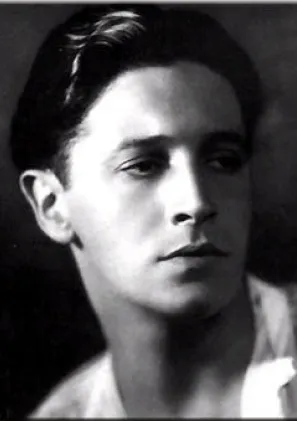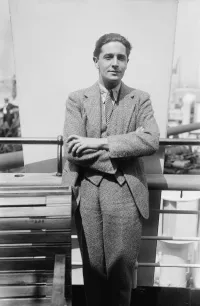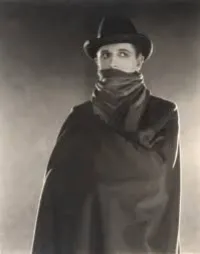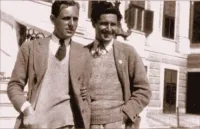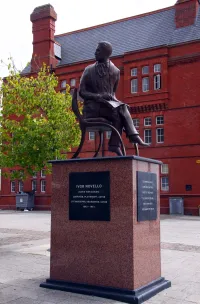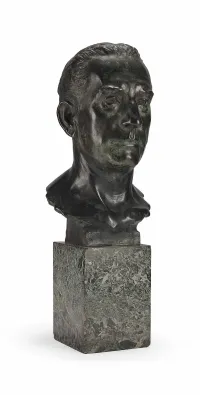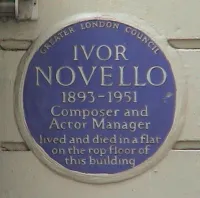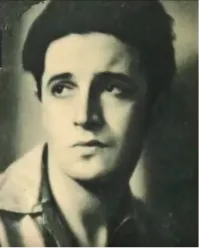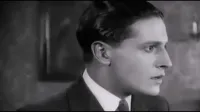Biography
1893 - 1951
“Things which do not require effort of some sort are seldom worth having.”
– Ivor Novello
Born David Ivor Davies in Cardiff, Wales, Ivor Novello began writing songs as a boy. He moved to London at the start of WWI in 1914 and wrote the hugely popular ‘Keep the Home Fires Burning.’ His success continued with the show ‘Theodore and Co’ (1916), co-written with Jerome Kern. In 1917 Novello met actor Robert Andrews, with whom he began a life-long relationship. Though he continued to write successfully for comedies and reviews, Novello soon turned to acting. He found success both on stage as well as in silent films including D.W. Griffith’s ‘The White Rose’ (1923), ‘The Rat’ (1926), and two early Alfred Hitchcock films including ‘The Lodger’ (1926). He is credited with giving young actress Vivien Mary Hartley the stage name “Vivien Leigh.” Novello was an enormously popular part of a gay circle which included Cecil Beaton and Noel Coward. In the U.S. he appeared on Broadway in ‘The Truth Game’ (1931) and ventured to Hollywood for several films both as a writer (‘Tarzan the Ape Man’) and actor (‘When Boys Leave Home’). Returning to London, Novello dominated the British theater from the mid-1930s until his death. He appeared in several lavish West End musicals such as ‘The Glamorous Night (1935), ‘The Dancing Years’ (1939), and ‘Perchance to Dream’ (1945). With Andrews was at his side, Novello died of a heart attack on March 6, 1951 at the age of 58, hours after performing in his own play ‘The King’s Rhapsody.’ Over 10,000 fans lined the London streets to say goodbye and his funeral service was broadcast live. Grove's Dictionary of Music and Musicians writes that until the advent of Andrew Lloyd Webber, he was the 20th-century's most consistently successful composer of British musicals. Since 1956 the Ivor Novello Award has been given annually to British songwriters & music publishers with past recipients including Elton John, Sting and Paul McCartney. His music was prominently featured in the score for the motion picture ‘Gosford Park’ (2002).
1893 - 1951
“Things which do not require effort of some sort are seldom worth having.”
– Ivor Novello
Born David Ivor Davies in Cardiff, Wales, Ivor Novello began writing songs as a boy. He moved to London at the start of WWI in 1914 and wrote the hugely popular ‘Keep the Home Fires Burning.’ His success continued with the show ‘Theodore and Co’ (1916), co-written with Jerome Kern. In 1917 Novello met actor Robert Andrews, with whom he began a life-long relationship. Though he continued to write successfully for comedies and reviews, Novello soon turned to acting. He found success both on stage as well as in silent films including D.W. Griffith’s ‘The White Rose’ (1923), ‘The Rat’ (1926), and two early Alfred Hitchcock films including ‘The Lodger’ (1926). He is credited with giving young actress Vivien Mary Hartley the stage name “Vivien Leigh.” Novello was an enormously popular part of a gay circle which included Cecil Beaton and Noel Coward. In the U.S. he appeared on Broadway in ‘The Truth Game’ (1931) and ventured to Hollywood for several films both as a writer (‘Tarzan the Ape Man’) and actor (‘When Boys Leave Home’). Returning to London, Novello dominated the British theater from the mid-1930s until his death. He appeared in several lavish West End musicals such as ‘The Glamorous Night (1935), ‘The Dancing Years’ (1939), and ‘Perchance to Dream’ (1945). With Andrews was at his side, Novello died of a heart attack on March 6, 1951 at the age of 58, hours after performing in his own play ‘The King’s Rhapsody.’ Over 10,000 fans lined the London streets to say goodbye and his funeral service was broadcast live. Grove's Dictionary of Music and Musicians writes that until the advent of Andrew Lloyd Webber, he was the 20th-century's most consistently successful composer of British musicals. Since 1956 the Ivor Novello Award has been given annually to British songwriters & music publishers with past recipients including Elton John, Sting and Paul McCartney. His music was prominently featured in the score for the motion picture ‘Gosford Park’ (2002).
Demography
Demography
Gender Male
Sexual Orientation Gay
Gender Identity Cisgender
Ethnicity Caucasian/White
Nations Affiliated United Kingdom United States
Era/Epoch Interwar Period (1918-1939) Roaring Twenties (1920-1929) World War I (1914-1918)
Field(s) of Contribution
Film
Military
Music
Theater
Commemorations & Honors
Scholarship Established by the Royal Academy of Dramatic Art
Bronze Bust of Ivor Novello by Clemence Dane Unveiled at Drury Lane (1952)
British Academy of Songwriters, Composers and Authors Created the Annual Ivor Novello Awards For Songwriting and Composing (1955)
Memorial Stone Unveiled in Honor of Ivor Novello in St. Paul's Cathedral (1972)
English Heritage Blue Plaque Unveiled in London (1973)
Strand Theatre Renamed the Novello Theatre (2005)
Statue of Ivor Novello Unveiled at Wales Millennium Centre in Cardiff Bay (2009)
Demography
Gender Male
Sexual Orientation Gay
Gender Identity Cisgender
Ethnicity Caucasian/White
Nations Affiliated United Kingdom United States
Era/Epoch Interwar Period (1918-1939) Roaring Twenties (1920-1929) World War I (1914-1918)
Field(s) of Contribution
Film
Military
Music
Theater
Commemorations & Honors
Scholarship Established by the Royal Academy of Dramatic Art
Bronze Bust of Ivor Novello by Clemence Dane Unveiled at Drury Lane (1952)
British Academy of Songwriters, Composers and Authors Created the Annual Ivor Novello Awards For Songwriting and Composing (1955)
Memorial Stone Unveiled in Honor of Ivor Novello in St. Paul's Cathedral (1972)
English Heritage Blue Plaque Unveiled in London (1973)
Strand Theatre Renamed the Novello Theatre (2005)
Statue of Ivor Novello Unveiled at Wales Millennium Centre in Cardiff Bay (2009)
Resources
Resources
Resources
